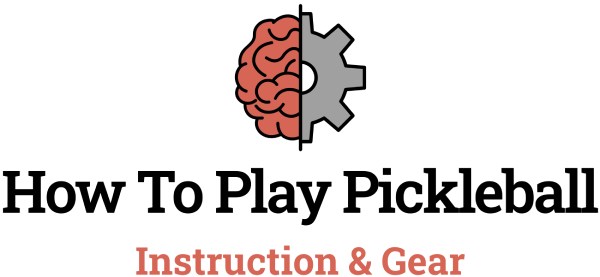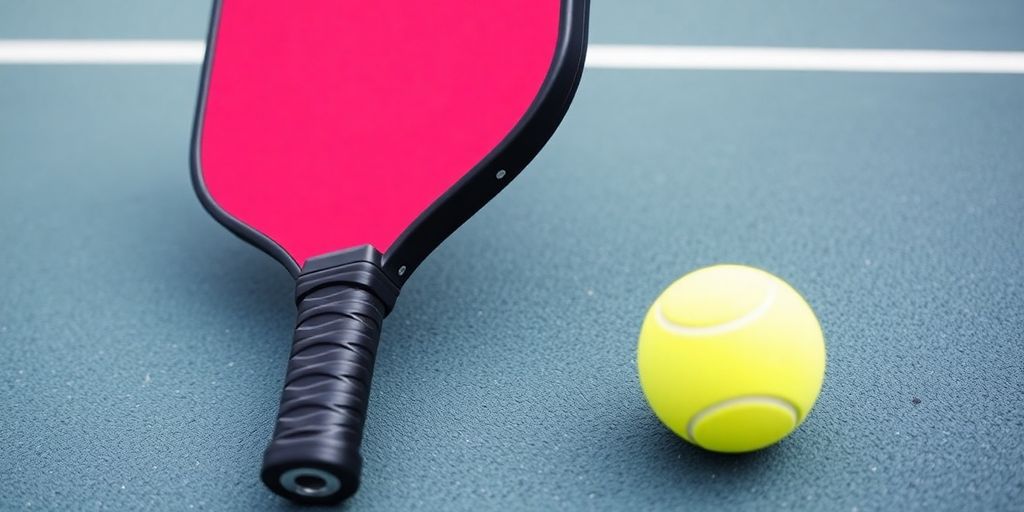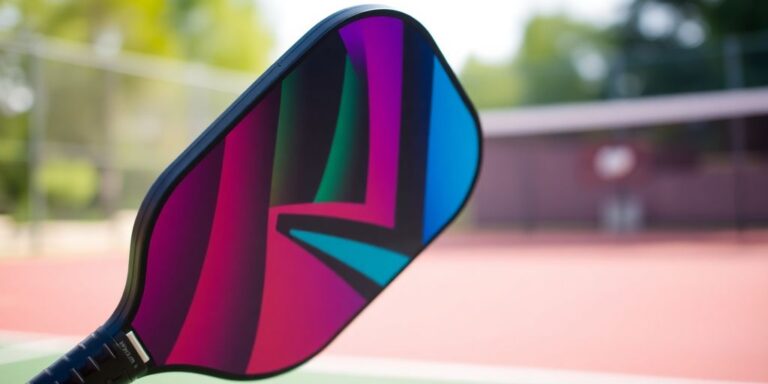Pickleball is one of those sports that seems to have popped up out of nowhere, and its name? Well, that’s a whole different story. It’s a mix of tennis, badminton, and ping pong, but the question on everyone’s mind is: why is it called pickleball? This article will take you through the origins of the game, the theories behind its quirky name, and how it became a beloved sport for all ages.
Key Takeaways
- Pickleball was invented in 1965 on Bainbridge Island, Washington.
- The name ‘pickleball’ has several theories, including a family dog named Pickles and a term from rowing called ‘pickle boat.’
- The Pritchard family played a big role in the game’s creation and popularity.
- Pickleball’s growth is fueled by its accessibility and community involvement.
- The sport has become a cultural phenomenon, attracting players of all ages and backgrounds.
Exploring The Fascinating History Of Pickleball
It’s pretty wild to think about how pickleball started. The history of pickleball is a fun story that goes all the way back to the summer of ’65. I mean, who knew a simple game made up on the spot would turn into such a big deal?
The Birth Of Pickleball
So, picture this: Bainbridge Island, Washington, 1965. Joel Pritchard and Bill Bell were just trying to keep their kids entertained. They grabbed some old equipment – a badminton net, some ping-pong paddles, and a wiffle ball – and started messing around. They didn’t know it then, but they were inventing something that would become a national phenomenon. It’s amazing how something so casual can turn into something so huge.
The Evolution Of The Game
From those humble beginnings, pickleball has come a long way. The equipment has changed a lot. Early on, they used ping pong paddles, but now there are specialized pickleball paddles that give players way more control. The balls are different too, designed to handle wind better. It’s cool to see how innovation has shaped the game over the years.
- The first paddles were just plywood.
- The nets started as badminton nets.
- The original balls were wiffle balls.
It’s interesting to think about how the rules evolved too. They started with what they had and made it up as they went along. That’s part of what makes pickleball so unique – it’s always been a game that’s open to change and adaptation.
The Role Of Community In Growth
One of the biggest reasons pickleball has taken off is the community around it. People love that it’s easy to learn and that anyone can play, no matter their age or skill level. It’s a super social game, and that’s a big part of its appeal. Plus, the growth opportunities through local groups and tournaments have helped spread the word and get more people involved.
- Local clubs organize games and events.
- Tournaments bring players together from all over.
- Social media helps people connect and share their love of the game.
Unraveling The Mystery Behind The Name ‘Pickleball’

Okay, so pickleball is super popular, right? But have you ever stopped to think about where that name even came from? It’s kind of a weird name, when you think about it. There are a couple of stories floating around, and honestly, nobody seems to know the real answer for sure. Let’s look at the main theories.
The Pritchard Family Dog Theory
This is probably the most well-known story. The tale goes that the Pritchard family had a dog named Pickles, and Pickles was obsessed with chasing after the pickleball during games. So, naturally, they named the game after their ball-obsessed pup. It’s a cute story, and it’s easy to remember. However, some people say that Pickles actually came after the name, which throws a wrench in the whole thing. It’s like the chicken or the egg, but with a dog and a pickleball game.
The Boat Naming Theory
Then there’s the "pickle boat" theory. A pickle boat, in rowing terms, is a boat made up of leftover rowers who didn’t make the main teams. The idea is that pickleball is kind of like that – a mix of different sports like tennis, badminton, and ping pong. So, the name "pickleball" could be a reference to this hodgepodge nature of the game. It’s a bit more of an obscure reference, but it makes a certain kind of sense. It’s like a sport’s unique combination.
The Connection To Pickleball’s Gameplay
Honestly, the name might not have a super deep meaning. Sometimes, things just happen, and names stick. Maybe someone said "pickleball" as a joke, and it just caught on. Or maybe it was a combination of both stories, with the dog story helping to solidify the name that was already floating around. Whatever the real reason, the name "pickleball" is definitely unique and memorable, which probably contributes to the sport’s popularity.
Ultimately, the true origin of the name might be lost to time. But hey, that’s part of the fun, right? It gives us something to debate and speculate about while we’re playing pickleball.
The Pritchard Family’s Influence On Pickleball
The Pritchard family’s impact on pickleball extends far beyond just inventing the game. They nurtured it from a backyard pastime into something much bigger. It’s amazing to think about how a simple idea, born out of summer boredom, could become a sport enjoyed by so many.
Joel Pritchard’s Vision
Joel Pritchard, one of the co-creators, wasn’t just looking for a way to entertain his family; he was inadvertently laying the foundation for a sport that would gain international recognition. His vision was simple: create a game that was easy to learn and fun for all ages. He probably didn’t realize he was creating a phenomenon. It all started with some ping pong paddles and a wiffle ball.
Family Involvement In The Game
The entire Pritchard family played a role in shaping pickleball. Joan Pritchard, Joel’s wife, is often credited with suggesting the name, adding a touch of whimsy to the sport’s identity. The family’s collective input helped refine the rules and make the game more accessible. It was a true family affair, and that’s part of what makes pickleball so special. It’s a game built on family fun.
Legacy Of The Pritchard Family
The Pritchard family’s legacy is undeniable. They didn’t just invent a game; they created a community. Pickleball’s growth can be attributed to its accessibility and social nature, qualities that were inherent from its very beginning. Their names are now synonymous with the sport, and their contributions will continue to be celebrated as pickleball evolves. The history of pickleball is intertwined with their story.
The Pritchard family’s dedication to pickleball is a testament to the power of simple ideas. Their backyard creation has brought joy and activity to countless people, proving that sometimes the best things in life are born out of a desire for simple fun. It’s a reminder that innovation can come from anywhere, even a summer afternoon on Bainbridge Island.
Theories Surrounding The Name Pickleball

So, how did pickleball actually get its quirky name? It’s a question that’s sparked a lot of fun debate. There are a couple of main theories floating around, and honestly, the real answer might be a mix of both, or something else entirely! Let’s explore the most popular explanations.
The Pickleboat Explanation
One of the more charming stories involves the term "pickle boat." The story goes that Joan Pritchard, Joel’s wife, suggested the name because it reminded her of pickle boats in rowing. These boats were filled with leftover rowers, kind of like how pickleball is a mix of different sports. It’s a nice, neat explanation, and it ties into the game’s origins as a bit of a hodgepodge of other racquet sports. Whether it’s the complete truth? That’s still up for debate.
The Dog Named Pickles
Then there’s the tale of Pickles, the Pritchard family dog. This is probably the more widely known story. The legend says that Pickles had a habit of running off with the pickleball balls during games. It’s a cute image, and it’s easy to see how that could lead to the name. However, some people dispute this, saying that Pickles joined the family after the game was already named. It’s a bit of a chicken-or-the-egg situation.
Regardless of which story is true, the name "Pickleball" has stuck, and it’s part of what makes the sport so memorable. It’s a fun, lighthearted name for a fun, lighthearted game.
Cultural References In Naming
Beyond the dog and the boat, it’s worth considering that the name might just be a product of the time. Back in the ’60s, quirky and playful names were pretty common. It’s possible that "Pickleball" was simply a catchy, memorable name that the creators liked, regardless of a specific origin story. It’s also possible that the name was inspired by the best pickleball ball available at the time. Sometimes, the simplest explanation is the most accurate.
Here’s a quick rundown of the theories:
- Pickleboat: Named after rowing term.
- Pickles the Dog: Named after the family pet.
- Random Choice: Just a catchy name that stuck.
The Impact Of Pickleball On Popular Culture
Media Representation Of Pickleball
Pickleball’s journey from a niche sport to a mainstream phenomenon is partly thanks to increased media attention. You see it popping up everywhere now. It’s not just about dedicated YouTube channels showing off amazing shots, but also news segments and features in lifestyle magazines. This exposure has helped to normalize pickleball, making it more accessible and appealing to a wider audience.
Celebrity Endorsements
Celebrity endorsements have definitely given pickleball a boost. When famous people start playing and talking about a sport, it gets noticed. It’s like, if it’s cool enough for them, maybe it’s cool enough for everyone else. This kind of attention can bring in new players and fans who might not have considered pickleball otherwise. It’s a pretty effective way to raise awareness and make the sport seem more appealing. The sport’s accessibility is a big factor in its appeal.
Pickleball In Community Events
Pickleball is becoming a regular fixture at community events. It’s a great way to get people active and socializing. Tournaments, demonstrations, and even just open play sessions are being organized in parks, community centers, and schools. This helps to build a sense of community around the sport and makes it more accessible to people of all ages and skill levels. It’s a fun, easy way to promote active lifestyles and get people involved.
Pickleball’s rise in popular culture is a testament to its inclusive nature and broad appeal. It’s a sport that’s easy to learn, fun to play, and can be enjoyed by people of all ages and abilities. This combination has made it a hit with everyone from casual players to serious athletes, and its popularity shows no signs of slowing down. It’s a great way to unite people from different backgrounds.
The Growth Of Pickleball As A Sport
Pickleball’s journey from a backyard pastime to a globally recognized sport is nothing short of remarkable. Its simple rules and accessibility have fueled its rapid expansion, attracting players of all ages and skill levels. The sport’s growth is evident in the increasing number of courts, tournaments, and dedicated players worldwide. Let’s take a closer look at the key factors driving this phenomenon.
Grassroots Movements
The organic growth of pickleball is largely attributed to grassroots movements. It all started with people introducing the game to their friends and family, creating local pockets of pickleball enthusiasts. These groups often organized informal games and clinics, spreading the word and fostering a sense of community. The ease of learning the game, combined with its social nature, made it an instant hit in many neighborhoods and retirement communities. Bay Pickle is actively promoting the sport in Hong Kong, which is a great example of this.
National And International Tournaments
As pickleball’s popularity surged, organized tournaments began to emerge, adding a competitive edge to the sport. These events range from local gatherings to national championships, attracting both amateur and professional players. The USA Pickleball Association (USAPA) plays a crucial role in standardizing rules and sanctioning tournaments, contributing to the sport’s legitimacy and growth. The rise in tournaments has also led to increased media coverage and sponsorship opportunities, further boosting pickleball’s visibility. The possibility of seeing pickleball in future Olympics is becoming more real every day.
Inclusivity In Pickleball
One of the most appealing aspects of pickleball is its inclusivity. It’s a sport that can be enjoyed by people of all ages, fitness levels, and backgrounds. This inclusivity has been a major driver of its growth, as it welcomes individuals who may not have found a sport they enjoy or excel at previously. The smaller court size and slower pace make it particularly appealing to seniors, while its social nature makes it a great way for people to connect and stay active. The projected 19.8 million active players in 2024 is a testament to this inclusivity.
Pickleball’s growth is not just about numbers; it’s about the community it creates. The sport fosters a sense of belonging and camaraderie, bringing people together from all walks of life. This social aspect is a key ingredient in pickleball’s recipe for success.
Here are some factors that will help pickleball grow even more:
- Sponsorship deals from leading brands can significantly boost visibility for the game.
- Dedicated TV channels or online platforms broadcasting professional tournaments live would attract wider audiences.
- An increased media coverage would help popularize pickleball further, cementing its place within mainstream sports culture.
Understanding The Appeal Of Pickleball
Accessibility For All Ages
Pickleball really shines because it’s so easy for anyone to pick up, no matter how old they are. You don’t need to be super athletic to enjoy it, and that’s a big part of why it’s become so popular. It’s not like tennis or squash where you need years of practice just to hit the ball properly. Even if you’ve never played a racquet sport before, you can start having fun pretty quickly. This makes it a great option for families, seniors, and anyone looking for a new way to stay active. The pickleball sport combines accessibility and excitement, attracting players of all ages.
Social Aspects Of The Game
One of the best things about pickleball is how social it is. It’s usually played as doubles, so you’re always interacting with your partner and the other team. This makes it a great way to meet new people and build friendships. Plus, the smaller court size means you’re closer to everyone, making it easier to chat and joke around. It’s not uncommon to see people hanging out after games, grabbing a drink, and just enjoying each other’s company. Pickleball is rapidly gaining popularity in America, offering players not only a fun and engaging sport but also social interaction and community building. The game fosters friendships and camaraderie among participants.
- Easy to learn rules.
- Doubles play encourages teamwork.
- Community events and tournaments.
Pickleball is more than just a sport; it’s a social gathering. The welcoming atmosphere makes it easy to connect with others, creating a sense of belonging and shared enjoyment.
Health Benefits Of Playing
Beyond the social perks, pickleball is also a fantastic way to stay healthy. It’s a low-impact sport, which means it’s easier on your joints than running or tennis. You still get a good workout, though, improving your cardiovascular health, strength, and agility. Plus, it’s a great way to burn calories and maintain a healthy weight. It’s a win-win situation: you’re having fun and getting fit at the same time.
Here’s a quick look at some of the health benefits:
| Benefit | Description |
|---|---|
| Cardio | Improves cardiovascular health. |
| Low Impact | Gentle on joints, suitable for all ages. |
| Agility | Enhances reflexes and coordination. |
| Calorie Burning | Helps maintain a healthy weight. |
| Mental Acuity | Requires strategic thinking, keeping your mind sharp. |
Pickleball is quickly becoming a favorite sport for many people. It’s fun, easy to learn, and can be played by anyone, no matter their age or skill level. If you want to dive deeper into why so many are falling in love with this game, check out our website for more insights and tips!
Wrapping It Up
So, there you have it. The name "pickleball" might come from a dog named Pickles or maybe from some rowing term about leftover oarsmen. Who knows? What’s clear is that this quirky name adds to the charm of a game that’s taken off like wildfire. It’s fun, it’s social, and it’s for everyone, no matter your age or skill level. As pickleball keeps growing in popularity, the story behind its name will keep sparking curiosity and smiles. Whether you’re playing in your backyard or at a big tournament, the name pickleball is now part of the fun.
Frequently Asked Questions
What is the origin of the name Pickleball?
The name ‘Pickleball’ has a few theories behind it. One suggests it was named after the Pritchard family dog, Pickles, who liked to chase balls. Another theory connects it to the term ‘pickle boat’ used in rowing, which refers to a boat with leftover rowers.
Who invented Pickleball?
Pickleball was created in 1965 by Joel Pritchard, William Bell, and Barney McCallum on Bainbridge Island in Washington. They wanted to make a fun game for their families.
Why has Pickleball become so popular?
Pickleball is popular because it’s easy to learn and can be played by people of all ages. It’s a fun way to stay active and socialize with friends.
Can you play Pickleball indoors?
Yes, you can play Pickleball indoors or outdoors. Many gyms and community centers have indoor courts set up for the game.
What equipment do you need to play Pickleball?
To play Pickleball, you need a paddle, a plastic ball with holes, and a court. The paddles are usually made of lightweight materials.
Is Pickleball similar to tennis?
Yes, Pickleball shares some similarities with tennis, but it is played on a smaller court, and the rules are a bit different. It combines elements from tennis, badminton, and ping-pong.




